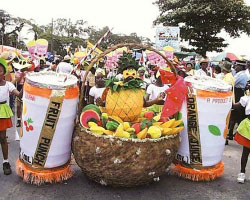
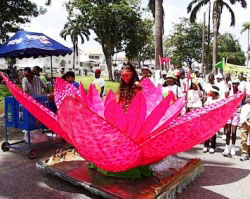



Each group in Guyana's multi-racial population brought to Guyana its distinct customs and traditions which to date, are reflected in the various festivals celebrated throughout the year. Most of the festivals have special significance to Guyanese regardless of their ethnic origins or religious background and beliefs. Some of the most popular festivals celebrated in Guyana are:


The word Mashramani comes from the Amerindian language and means "the celebration of a job well done". Mashramani, often referred to as "Mash", is usually celebrated on the 23rd of February-Guyana's Republic Day-to commemorate the "Birth of the Republic". This celebration is probably the most colouful of all the festivals. There are outstanding costume competitions, float parades, masquerade bands, and dancing in the street to the accompaniment of steel band music and calypsoes. Masquerades perform acrobatic dance routines on the streets. Calypso competitions are another popular part of "Mash", and this leads into the cornation of a King or Queen for the particular year.

Phagwah is a Hindu religious holiday observed in March to celebrate the triumph of good over evil. Hindus traditionally wear white on Phagwah day and indulge in the throwing upon each other of a harmless liquid called abeer. Abeer is a red dye which symbolizes the blood of the tyrannical King Kiranya who in Hindu lore was ordered burnt alive by his son Prince Prahalad because of the suffering which his people endured at the hands of his father. Powder, perfume, and water are also thrown on family, friends, and neighbours on this day by Hindus and non-Hindus alike in what is an amusing, good-natured and joyful celebration.
Easter generally begins with a Holy Week which ends on Easter Monday. The dates on which these days are observed are based on the Christian calendar, but follows immediately after. In Guyana, Good Friday which falls within that week and is observed as the day of which Jesus Christ was crucified, is one of the most solemn and quiet days of the year. All places of business remain closed in the towns and villages. Hot "crossbuns" are served and eaten, and most Christian families attend church services during the day. The season ends on Easter Monday when the entire country participates in a grand all-day picnic which includes kite flying, playing cricket, and being outdoors to signify and celebrate the resurrection of Jesus Christ from the dead and his ascension into heaven.
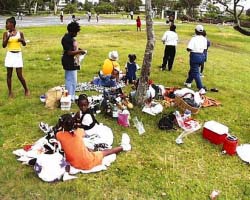
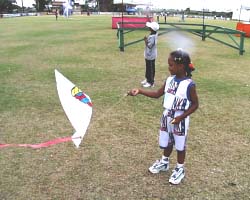
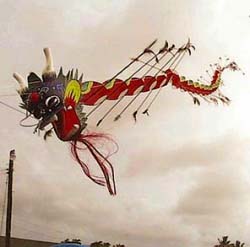
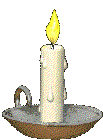
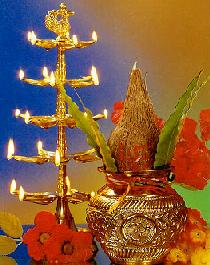

Diwali, known as the Festival of Lights, is usually celebrated at the end of October. It is mainly celebrated by Hindus across the world. It is a festival of joy, splendor, brightness and happiness. Diwali literally means row of diyas (clay lamps). This festive occasion marks Lord Rama's return to his kingdom Ayodhya after completing his 14-year exile. Oil lamps or diyas light up every home and firework displays are common all across the country. The goddess Lakshmi (consort of Vishnu), who is the symbol of wealth and prosperity, is also 
 worshipped on this day. The festive occassion also marks the beginning of the Hindu new year and Lord Ganesha, the elephant-headed god, the symbol of auspiciousness and wisdom, is also worshipped in most hindu homes on this day.
worshipped on this day. The festive occassion also marks the beginning of the Hindu new year and Lord Ganesha, the elephant-headed god, the symbol of auspiciousness and wisdom, is also worshipped in most hindu homes on this day.
In Guyana the international Christian holiday of Christmas is celebrated on the 25th of December to commemorate the birth of Jesus Christ. The entire season extends for twelve days into the new year. There is no difference between Christians and non-Christians in Guyana at Christmas. As at Mashramani, masquerades appear in full glory with "Mother Sally" a popular figure costumed as an oversized doll, and stilt dancers. There is also street dancing. It is during this period that Guyanese dance throughout the night until the wee hours of dawn and entertain their friends and loved ones.


